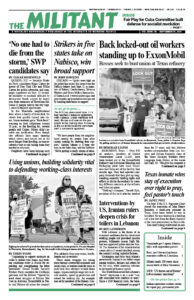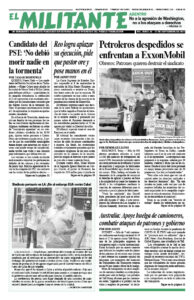September 30, 1996
The “Defense of Marriage Act” advances the reactionary, antilabor goals of the U.S. rulers. The law bars federal recognition of marriages among gays and lesbians.
The bill is part of the employers assault on the social wage of working people. It makes use of reactionary and divisive prejudices against gays and lesbians to single out a layer of working people and others and deny them federal entitlements. These include the right of a surviving spouse to continue receiving a portion of Social Security, veterans, or other benefits of a deceased partner.
Such legislation targets certain individuals as less than fully equal before the law.
All working people have a stake in joining those already opposed to this reactionary legislation, explaining its far-reaching antilabor implications and demanding civil rights for gays and lesbians now!
October 1, 1971
SAN JUAN — The largest and most militant demonstration in the history of Puerto Rico’s independence movement took place here Sept. 12, to protest the annual U.S. governors’ conference. The demonstration also commemorated the anniversary of the birth of Don Pedro Albizu Campos, leading Puerto Rican nationalist, who died in 1965 after spending most of his active life in prison for his activities on behalf of independence.
Independence leaders estimated that 80,000 to 100,000 participated. Thousands more were unable to attend because of lack of transportation.
The [Luis] Ferré government pleaded with the leaders not to carry slogans or shout “Yanqui Go Home!” According to the governor, such behavior would injure the Puerto Rican tradition of hospitality. To the surprise of no one, “Yanqui Go Home!” became the main theme of the demonstration.
September 28, 1946
The victory of the striking Japanese seamen over the [U.S.-military-run] puppet government last week was a triumph for the entire Japanese labor movement. The 10-day-old strike, involving more than 100,000 workers, was settled only after the seamen won all of their major demands.
According to a dispatch in the Sept. 17 Christian Science Monitor, “American crews aboard Liberty ships in Yokohama are sympathizing with Japanese strikers and in some cases have shown a willingness to join in the strike.”
The seamen’s strike spread rapidly to include almost 1,000,000 workers, a third of the organized labor force, and included the major affiliates of the Japanese CIO and the organized farmhands.
Defying General MacArthur’s recent dictatorial decree against strikes, the workers demonstrated their refusal to be driven back to semi-feudal conditions of servitude.

